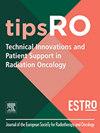Bridging cultural and linguistic barriers: South Asian minority women’s experiences of radiotherapy for cervical cancer in Norway
IF 2.8
Q1 Nursing
Technical Innovations and Patient Support in Radiation Oncology
Pub Date : 2025-05-17
DOI:10.1016/j.tipsro.2025.100315
引用次数: 0
Abstract
Introduction
This study explored the experiences of women with South Asian ethnicity who received chemoradiotherapy for cervical cancer in Norway. Research on how they cope with radiotherapy, as well as the challenges they face in relation to cancer care, is crucial to generate new knowledge about the situation of minority women. This study sought to promote a more equitable healthcare service and provide more personalised information for minority women.
Methods
This study has a qualitative, exploratory design and applied a phenomenological and hermeneutical approach based on individual in-depth interviews with seven South Asian women. These women moved to Norway after the age of 18 and subsequently received chemoradiotherapy for cervical cancer. The interviews were conducted in each woman’s own language. The data were interpreted via reflexive thematic analysis.
Results
The data analysis revealed that a lack of cultural understanding among healthcare professionals made the treatment experience challenging for the interviewed women, while a lack of familiarity with the Norwegian language made health information less accessible to them. Linguistic and cultural barriers rendered the women vulnerable, both during their treatment and during the scheduled clinical follow-up period, which was often reported to be a lonely experience.
Conclusion
The experiences of minority women with cervical cancer who are treated with radiotherapy are influenced by challenges related to culture and language. This highlights a clear need for individually tailored health information and access to professional interpreters. Additionally, there is a need for support groups conducted in minority languages.
弥合文化和语言障碍:南亚少数民族妇女在挪威宫颈癌放疗的经历
本研究探讨了在挪威接受宫颈癌放化疗的南亚裔妇女的经历。研究她们如何应对放射治疗,以及她们在癌症治疗方面面临的挑战,对于产生关于少数民族妇女状况的新知识至关重要。这项研究旨在促进更公平的医疗保健服务,并为少数民族妇女提供更个性化的信息。方法本研究采用定性、探索性设计,采用现象学和解释学方法,对7名南亚妇女进行了深入访谈。这些妇女在18岁后移居挪威,随后接受宫颈癌的放化疗。访谈是用每位妇女自己的语言进行的。数据通过反身性主题分析进行解释。结果数据分析显示,医疗保健专业人员缺乏文化理解使受访妇女的治疗经历具有挑战性,而不熟悉挪威语使她们难以获得健康信息。语言和文化障碍使这些妇女在治疗期间和预定的临床随访期间都很脆弱,据报道,这往往是一种孤独的经历。结论少数民族宫颈癌妇女放疗的经历受到文化和语言挑战的影响。这突出了对个性化卫生信息和获得专业口译人员的明显需求。此外,还需要以少数民族语言开展支助小组。
本文章由计算机程序翻译,如有差异,请以英文原文为准。
求助全文
约1分钟内获得全文
求助全文
来源期刊

Technical Innovations and Patient Support in Radiation Oncology
Nursing-Oncology (nursing)
CiteScore
4.10
自引率
0.00%
发文量
48
审稿时长
67 days
 求助内容:
求助内容: 应助结果提醒方式:
应助结果提醒方式:


